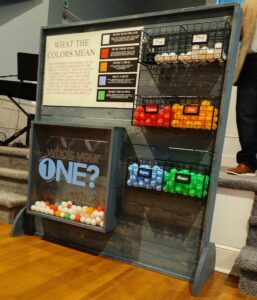Measuring Success in Ministry (Part 2)
Measuring Success in Ministry (Part 2)
I feel like there are two kinds of people in the world. One type is wired to love English/History. They most likely enjoyed these classes in school and did well in them. They love that a sentence can mean different things when read in different ways. They enjoy words and stories. The other type of person is geared toward Math/Science. They performed well and liked those subjects in school. Ambiguity is frustrating to them. They enjoy numbers, measuring things, and equations.
My husband is this type of person. He is a numbers guy. Give him a spreadsheet and some formulas, and he will “Excel” at putting it all together. (As you may have guessed by that horrible pun, I am the other type. Words are awesome and I use a lot of them–the punnier the better.) This skill as a numbers person worked really well for him when his career was in Logistics and Warehousing. But as a Replant Pastor, playing the numbers game can be discouraging and frustrating.
Ministry Maxims
In the most recent episodes of the podcast, Jimbo and Bob have been discussing some new “Ministry Maxims.” These truths, when applied to replanting, can shift our mindset and help create new practices that allow replant pastors to see and celebrate the successes instead of focusing on the setbacks.
In the first episode of the series and in last week’s blog, we focused on the first three Maxims:
- Discerning and Adapting
- Leading Paradigmatic Change
- Empowering and Equipping Others
In this week’s episode, we added two more:
4. Actions over Results
5. The Importance of Multi-stream Revenue
Changing the Metrics for Measuring Success
If you are a numbers guy, like my husband, your metric for success in your church might be attendance, baptisms, and discipleship program participation. But in the Summer, when we experience a “Summer Slump,” those numbers may seem a bit skewed. And truthfully, those numbers might not be giving you a full picture the rest of the year, either.
Instead of looking at those results, shift your mindset to a new Ministry Maxim– measuring actions, not results. When we measure results, we are often looking at the end point of a journey that actually had several successes along the way. An increase in attendance is hopefully a result of successfully reaching your community. Increased baptisms is a result of successfully discipling your congregation to recognize that important step of public obedience. And an increase in discipleship participation is certainly a result of equipping and empowering your congregation to make disciples and to take their faith to the next step. Each of those seemingly small steps is a chance to celebrate success!
In my church, as in many others, we have a display that gives us a visual reminder that every success is important. We refer to it as the “Who’s Your One” board. There are five colored ping pong balls, and we drop them in whenever we successfully complete a step in our gospel process. The first ball is white– we write a person’s name on it as our “One.” This person is someone we have identified as a person in our sphere of influence to whom we are making the commitment to pray for daily and to engage with the Gospel. The next ball is red. We drop those in when we have listened to and heard our “One’s” story. Next, we have the orange ping pong ball. These are used when we share a meal with our “One.” The next ball is blue, and it represents meeting a need for our “One” in a tangible and practical way. And the final ball is green, and it represents the moment when we are able to share a gospel conversation with our “One.”

Each of these balls has a story and represents not just a small step, but a consistent and committed effort to reach someone who is far from God with the life-changing Gospel of Jesus Christ. We know that each of these steps are worth celebrating– not only for the potential result of a new life in Christ, but for our members who are growing in their faithful obedience to God’s call to share their faith.
Our decision to celebrate these small steps was strategic: first, we identified the measurements that were important to us as a church. We weren’t looking to be the biggest church in town, and we didn’t want to grow from membership transfers. We wanted to reach people who were far from God with the Gospel, and we wanted our members to take ownership in that process. So our metric went from “Are you inviting people to church?” to “Are you sharing your life with someone who needs the Gospel?” Once we identified the actions that represented that goal, then we communicated them to our people and built a visual reminder of them. And lastly, we celebrate each time a ball is dropped in that display.
What are the actions your church is taking toward reaching your community? Are your members meeting the needs around them? Celebrate it! Are they engaging in conversations with others? Celebrate it! These are important victories that are going to lead to bigger results. Every Sunday, take time to recognize the successes and remind your congregation that each step is vital, not just the end goal.
Changing the Metrics for Measuring Revenue
As Bob pointed out in the podcast, we are entering into a season where resourcing mission and ministry will require more than just tithes and offerings. While there is a biblical mandate for the congregation to support the ministry with those gifts, replant pastors would benefit from shifting their thinking from a sole source of revenue to multiple avenues to generate income for their church.
Often, replant churches have a lack of money and manpower. But what they do have, sometimes in abundance, is property and buildings. Those unused classrooms and parcels of land that have sat empty can be used as income-generating revenue for your church that you can use to move the ministry and missions of your church forward.
Our church had an empty 4 acre corner lot at the edge of our property. Because of the way it was positioned, the church could never use it for any specific purpose. Much of it had overhead power lines that would prevent us from being able to build, and it was too far from the current sanctuary to be beneficial for us.
After much prayer and discussion, we opted to sell the property. We were specific in what we were looking for. We wanted a buyer who would develop the 4 acres into new, affordable housing for our community. The property sold within a few weeks, and now there are newly constructed homes on ½ acre lots waiting for new families to settle in.
But the income we generated in that sale didn’t just sit in a savings account to gather interest. We used it to repave and paint our parking lot, which was dangerously uneven and had grown into a weed-filled eyesore. The new layout of the parking lot not only gave us a better first impression to visitors and to our community, but it also provided several new parking spots in the repainting. The ministry and the mission of our church was funded through the sale of a parcel of land we would never use.

Another church in our association had an excess of space in their building. They recognized that unused classrooms and hallways were not functioning as the best use of their church. Instead of shutting them down and leaving them empty, the church partnered with a local Christian school and leased the space to them. Through the week, this Christian school meets in those once-empty classrooms and uses the space. What was once an empty hallway is now a thriving school. This partnership generates income for the church while meeting the need for Christian education availability in the community. The mission and ministry of the church is funded by utilizing an otherwise unused resource.
Maximizing the Maxims
In my family, we will often talk about needing a “win,” or a success. Sometimes it’s a good grade on a test, an unexpected check in the mail, or a presentation at work going better than I expected. But when we’re feeling like we’re taking loss after loss and we’re discouraged and banged up, our wins can be small things: finding a close to the door parking space in the rain, realizing we have money on a gift card for lunch, or an uplifting word from a friend. Celebrating these small wins helps me focus on the positive things in my life.
Likewise, when we utilize these Ministry Maxims, we shift our mindset from focusing on setbacks to looking at successes. Instead of being discouraged and frustrated by places we think we’ve failed, we recognize the places where God is still working and moving in our congregations. And when we get excited about that, so do our members!
Which ministry maxim are you most interested to implement? Let us know in the comments or connect with us on social media!















